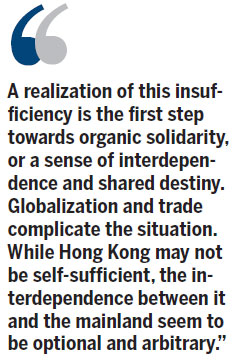The fuss about MK wee-wee controversy
Updated: 2014-04-25 05:22
By Jony Lam(HK Edition)
|
|||||||||
In The Division of Labor in Society, French sociologist Emile Durkheim discussed how the division of labor is beneficial to society because it increases the productive capacity, the skill of the workman, and creates a feeling of solidarity among people.
There are two kinds of social solidarity, according to Durkheim - mechanical solidarity and organic solidarity. Mechanical solidarity connects the individual to society without any intermediary. That is, society is organized collectively and all members of the group share the same beliefs. The bond that binds the individual to society is this collective conscious, this shared belief system. With organic solidarity, on the other hand, society is a system of different functions that are united by definite relationships. Each individual must have a distinct job or action and a personality that is his or her own.
Durkheim was a gifted theorist, but he has coined his shares of confusing terminologies. It's difficult to imagine our contemporaries labeling what exists in pre-industrialized, rural and traditional societies as mechanical, and that in industrialized urban societies organic. This, in part, reflected Durkheim's dismissal of the organicist thinking that influenced many intellectuals of his generation, where human societies are analyzed with analogies to biological organism.
Using Durkheim's framework, our city seems to be bonded by mechanical solidarity, which is characterized by moral and religious homogeneity, with little difference in individual labor. This suggests that Hong Kong is an "early society". How interesting.

In my last piece, I wrote about the limitations of Hong Kong's hyper-urban experience, and the associated neglect of agricultural and manufacturing elements. In view of the clash between Hongkongers and mainland parents after a toddler urinated on a Mong Kok street, it seems fateful that I also said: "Hong Kong can be 'clean' only because we are excluding many vital functions. Farmers have dung on their feet; factory workers have grease on their sleeves - that is why Hongkongers have food on their tables."
To achieve organic solidarity in a modern society, according to Durkheim, we must view society as a system of different functions that are united by definite relationships. The question is what is the proper unit of analysis? Are we talking about the Hong Kong society or the Chinese society, which includes Hong Kong? If we are talking about a system of different functions in which we find ourselves interdependent, Hong Kong is definitely too small. It lacks many vital functions to be self-sufficient.
A realization of this insufficiency is the first step towards organic solidarity, or a sense of interdependence and shared destiny.
Globalization and trade complicate the situation. While Hong Kong may not be self-sufficient, the interdependence between it and the mainland seem to be optional and arbitrary. The consumption of chickens is a perfect example. Live chicken are fresher and tastier than the frozen imports, but an exaggerated fear towards avian flu is keeping us away from them. Sales of live chickens are often banned when there are signs of infections on the mainland. Avian flu may indeed be deadly, but I've witnessed few reservations towards live chickens on the mainland. The truth is, if they are not banned, many Hongkongers will still be buying.
A lot has been written about the Mong Kok wee-wee controversy, at least in the press on the mainland. People argued about who broke the rules first, who got rude first and who went physical first. We may never know for sure unless we have video evidence. But to capture on tape a toddler peeing is gross, and we should not encourage such behavior.
"There is no truth without a photo" is a popular saying in town. Mankind is now obsessed with taking photos and sharing them on Facebook or Twitter. We shoot our friends, our food, our events and perhaps our toes. Then we thought: Why not shoot that young kid peeing and upload that too? That would have earned a lot of shares and likes.
This is how the discussion unfolds online. "The mainlanders are so uncivilized!" "How many toddlers can hold on long enough when they want to relieve themselves? And the mother used a paper nappy to catch the urine." "A nappy? Show me a photo to prove it."
The author is a current affairs commentator.
(HK Edition 04/25/2014 page9)